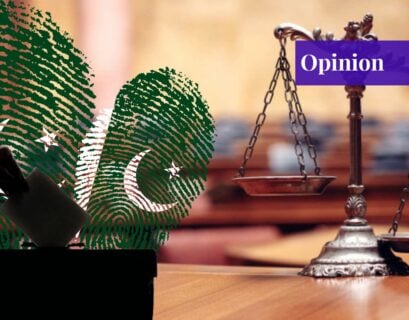Ali Anwaar is currently a student of law at the Islamia University of Bahawalpur, with ambitions of pursuing human rights and legislative drafting. He is currently working as the Publishing Head in The Law Academy to spearhead the development of subject books that aim to revolutionize legal education in Pakistan.
A law student sits in a crowded classroom, his desk littered with a dusty book and half a stack of notes. A professor drones on, reciting dry legal statutes and concepts as the student struggles to stay awake. It would not be hard to assume that the student’s mind wanders, possibly thinking of the exciting allure of real-world legal challenges. Yet, the student remains confined to the narrow scope of the classroom, learning only how to read notes instead of how to think like a lawyer.
While such arguments are not uncommon from every corner of the Pakistani education system, the repercussions for law students might surpass all other wails and cries.
Justice is the cornerstone of any civilized society. It is through a fair and effective legal system that we ensure that justice is served, and the rule of law is upheld, but how can we achieve this if our legal education system is outdated, ineffective, and irrelevant? Fraught with problems, from outdated curriculums to ineffective teaching methods, the Pakistani legal education system leaves much to be desired.
The Ground Reality of Legal Education in Pakistan
The thought of studying law, the profession followed prolifically by national and international leaders alike, is often enthralling and exhilarating. To the outsider’s eyes, seeing young students wearing their uniform, flocking around in small groups, and attending classes with stacks of books in their hands might imply an incredibly competitive and fast-paced studying environment. However, such vistas hide grievous and often unheard issues that take little insight to uncover.
Outdated Curriculum
For most public institutions in Pakistan, legal education continues to suffer from outdated and irrelevant curricula that fail to equip students with the necessary skills and knowledge to meet the demands of a modern legal profession. Unlike other disciplines, a law college’s curriculum must be organized around societal problems, such as fundamental human rights, dispute resolution, and international law.
Such an approach suits the eventual practice of lawyers as problem-solvers and gate-keepers of justice, giving them the necessary knowledge to best all the legal and professional challenges they might face.
In stark contrast, Pakistani legal institutes offer mandatory and one-size-fits-all courses on specific codes and laws with limited practical relevance to the real world, leaving students ill–equipped to handle legal complexities. Instead of learning how to think critically and creatively, law students in Pakistan are simply taught to memorize a list of statutes and case laws for the sole purpose of clearing their exams.
Such a lack of practical exposure naturally results in a limited and outdated skill set that does not promote innovation or critical thinking, both of which are integral skills for the modern-day lawyer in a rapidly changing world.
Lack of Interdisciplinary Education and Research
Nearly all experts in academia and practice identify that law does not exist in a vacuum and has numerous social, economic, and political intricacies that may directly or indirectly impact legal issues. Legal education must not only be about learning legal codes but developing a broad range of interdisciplinary skills and knowledge that make it possible for lawyers to actively pursue justice in the wake of contemporary issues.
In a bid to emulate such learnings, law colleges attempt to teach subjects like Sociology and Political Science but do so through traditional lecture-based methods, which do not promote or encourage critical thinking or engagement. Instead of being given the opportunity to participate in group discussions, debates, and mooting exercises, students are handed notes and PowerPoint slides to memorize and spontaneously rewrite on their exams, where the accuracy of their words is rewarded with greater grades than their peers.
The consequences of such an approach are not difficult for any reasonable person to assume as Pakistani law graduates are ill-prepared to tackle the increasingly complex and interdisciplinary legal issues arising from technology, finance, and business.
No Practical Education
Despite the acceptance of the fact that practical skills are a fundamental requirement for excelling in the legal profession, most students are often left to figure out the practical aspects of their profession on their own or through internships, many of which are inaccessible due to the socio-economic and geographical constraints for thousands of students.
This lack of practical training can easily deprive novice lawyers of becoming experts as they find few opportunities to apply legal knowledge to real-life scenarios. The antlers of a newly-minted lawyer may dazzle with theoretical knowledge, but without the nourishment of practical experience, they wither away into useless decay; just like the rusted barrels of a gun that cannot fire, leaving him unable to navigate the terrain of the real legal world.
Trapped in the limited confines of their intellectual “boxes”, students might excel in exams, landing perfect scores, but when faced with practical challenges, may put both their reputation and the interests of their clients at risk.
As can be seen, legal education in Pakistan is in dire need of reform. Outdated curricula, lack of interdisciplinary education, and a dearth of practical training opportunities produce “raw graduates” instead of law graduates, that are simply unable to navigate the complexities of the modern legal system.
Naturally, they fail to provide effective legal representation, inhibiting access to law and justice for many people in Pakistan, particularly those who are socioeconomically disadvantaged or live in remote areas where resources are already scarce.
Revamping Pakistani Legal Education
In order to ensure equitable access to justice, fortify the efficacy of the legal framework, and empower the existing legal system, it is crucial to implement reforms in legal education to keep us up with the evolving global landscape.
Engaging in introspection by evaluating successful practices of other countries can serve as a potent catalyst for policymakers and stakeholders to bring forth solutions for the current decadent system of legal education.
Revolutionize the Curriculum
To create lawyers that can address contemporary legal challenges and uphold justice, legal institutions must restructure their curricula to involve not only traditional legal subjects but also interdisciplinary and practical learning. For example, courses in emerging areas of law such as technology and environmental law are equally important as core subjects like contract and criminal law, helping students build a more nuanced understanding of the legal profession.
Naturally, such efforts may not materialize without intensive pedagogical training that fosters collaborations between academics and the industry to truly create law students that can be capable of driving sustainable social change. The system cannot suffice simply by churning out rough slabs and expecting the already deteriorating legal system to polish them; such actions only contribute towards maintaining the dispiriting status quo.
Fostering Practical Skills
The existing curriculum could also be enhanced by incorporating extensive clinical legal education, moot court exercises, and effective internships to bridge the gap between theoretical and practical legal education. By simulating and pitching students in real-world settings, students can gain valuable experiences that can allow them to see the societal impact of their legal issues and increase the ethical responsibilities that come with practicing the field of law.
There should be active collaboration between academic institutions and stakeholders in the legal profession to ensure that the practical aspects of legal education are adequately addressed and that graduates are equipped with the core competencies to navigate the challenges of the legal profession. Such collaborations promote a more holistic teaching that prepares students for the realities of the legal system while also meeting the changing needs of society.
Promoting Critical Thinking and Innovation
In addition to the substantive content delivered through the curriculum, legal education must also be focused on developing critical thinking and analytical skills in law students. One of the most effective strategies to do so is by adopting the Socratic Method of teaching, as is employed in US law colleges, encouraging students to think independently through reasoning and going beyond contention and intuition.
The law does not remain constant and is subject to change with society. It is imperative to realize that law schools and professors cannot provide all the answers, but they can instill the necessary reasoning skills and culture of innovation needed to embrace new ideas and the best contemporary legal challenges.
Incorporating Technology into Legal Education
E-libraries and legal research databases have existed for years now, but their use among students remains limited. Most Pakistani institutes do not provide the necessary access or guidelines for law students to employ technology effectively in their careers, forcing them to rely on archaic libraries and spend countless hours on research that would have taken a few minutes with modern databases.
With the inception of artificial intelligence, the profound impact of technology on law has only changed, allowing lawyers to radically improve their efficiency and productivity, a trend in which Pakistani lawyers are lagging behind.
At the same time, institutes and stakeholders should emphasize creating and promoting online learning platforms, virtual reality simulations, and interactive case studies to offer students a more engaging and immersive learning experience without geographical and physical constraints, helping in creating a more inclusive legal education system where students from underprivileged and underdeveloped areas are not entirely deprived of opportunities.
By incorporating interdisciplinary coursework, providing practical learning opportunities, leveraging technology, and fostering a culture of innovation, Pakistani legal education can shake the rotten foundations of the current legal system and help shape it into a far more inclusive and equitable avenue of justice.
The Potential Impacts of a Reinvigorated Legal Education System
The legal system in Pakistan has long been criticized for its slow, outdated, and cumbersome procedures, lack of equitable access to justice, and archaic regulations that disregard contemporary social thought and jurisprudence. Despite limited efforts to modernize the legal system, there are still numerous challenges that can only be faced by a highly professional and educated class of young lawyers that can lead the way and truly raise the bar.
The outdated framework that has led to ineffective legal remedies can be easily overcome as fresh graduates come equipped with knowledge and skills in emerging areas of law. Likewise, the constant denial of justice and loss of confidence in the legal system due to inexperienced and unprofessional lawyers would also fade away gradually when trained graduates that can provide effective representation for their clients join the ranks.
While daunting to imagine, over time, the widespread perception of corruption and inefficiency in the judiciary, which further undermines public trust in the legal system, will also be overcome when expert lawyers become exceptional judges.
In Pakistan, geographical and financial constraints further limit access to justice for vulnerable populations. While this happens due to a variety of reasons, increasing access to quality education for law graduates in such areas can ensure that lawyers are more attuned to the needs of marginalized populations and can steadily increase access to justice.
The incorporation of modern educational methods and technologies would mean that graduates can continue to be life-long learners and emerge as leaders in their own communities. As we look towards the future, a reinvigorated legal education system might be the missing link in drastically impacting social change and creating a more just and equitable society in Pakistan.
In a country where justice has been elusive for most, it is nigh time to embrace a new era of legal education and empower a generation of lawyers who can transform the legal landscape and bring justice, not as a privilege but as a fundamental right for all.
If you want to submit your articles, research papers, and book reviews, please check the Submissions page.
The views and opinions expressed in this article/paper are the author’s own and do not necessarily reflect the editorial position of Paradigm Shift.



















